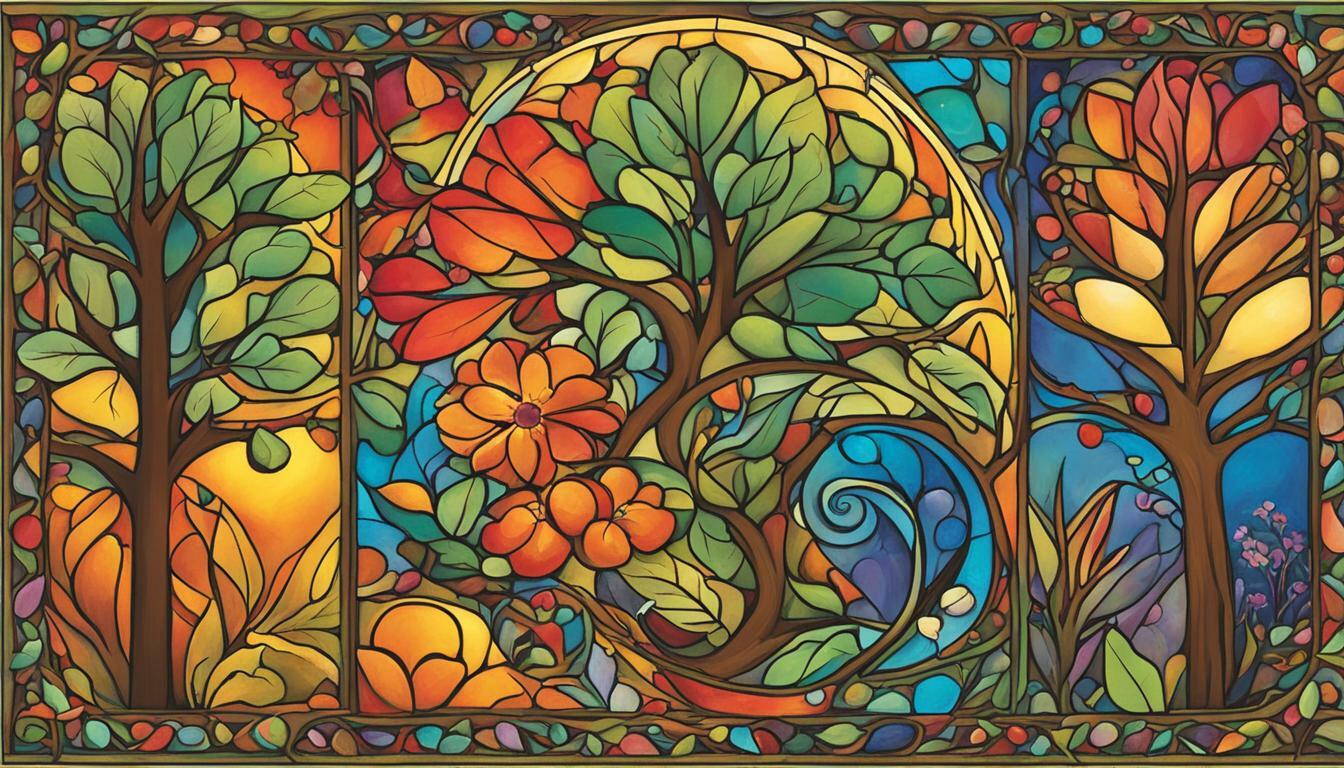The number 5 holds profound symbolism in the Bible, representing God’s grace and favor towards humanity. Throughout Scripture, the number 5 is associated with acts of grace, mercy, and goodness. It is mentioned in various contexts, revealing its deep spiritual meaning.
For instance, the Ten Commandments are divided into two sets of 5 commandments, emphasizing our relationship with both God and our fellow human beings. This division highlights the importance of living in harmony with both God’s laws and our responsibilities towards others.
In addition, God commanded 5 primary types of offerings, showcasing His desire for His people to approach Him with their worship and gratitude. These offerings were a symbol of their devotion and acknowledgment of His grace in their lives.
The book of Psalms, a collection of poetic prayers and songs, is divided into 5 major sections. This division allows for a well-rounded exploration of human experiences, emotions, and the journey towards God. The number 5, once again, reflects the multifaceted nature of God’s grace and the depth of His love for His creation.
Furthermore, the construction of the Tabernacle, a sacred space for worship, was intricately tied to the number 5. Its dimensions and design aspects were based on this significant number, signifying the divine presence and the importance of approaching God with reverence and awe.
Even the anointing oil used for consecration in biblical rituals employed the number 5. This oil, a symbol of God’s chosen ones, was composed of a mixture of 5 specific ingredients. Its use represented a special consecration and a setting apart for God’s purposes.
In conclusion, the number 5 in the Bible embodies the abundant grace of God. It signifies His favor, goodness, and mercy towards humanity. From the divisions of the Ten Commandments and the book of Psalms to the construction of the Tabernacle and the anointing oil, the number 5 serves as a reminder of God’s love and His desire for us to experience His abundant grace in every aspect of our lives.
Biblical References to the Number 5
Throughout the Bible, we encounter various references to the number 5, each carrying a unique meaning. One notable example is found in the story of Joseph, where Pharaoh has two dreams that are interpreted by Joseph. In these dreams, there are 7 cows and 7 heads of grain that are devoured by 7 other cows and 7 thin heads of grain. Joseph explains that the 7 cows and the 7 heads of grain represent 7 years of abundance, followed by 7 years of famine. The repetition of the number 7 is significant, as it emphasizes a complete and perfect cycle. However, the number 5 also appears in this story, as Pharaoh’s dreams occurred in the 5th year of his reign. This introduces a sense of urgency and warning, highlighting the importance of preparation for the coming famine.
Another biblical reference to the number 5 can be found in the story of the feeding of the 5,000. Jesus takes 5 loaves of bread and 2 fish, blesses them, and miraculously feeds a multitude of people. This miracle not only demonstrates Jesus’ power and provision but also emphasizes the concept of abundance. Despite the seemingly insufficient resources, Jesus is able to provide more than enough for everyone present. The number 5 in this context symbolizes the generous and abundant grace of God.
“And Jesus said, ‘Bring them here to me.’ Then he ordered the crowds to sit down on the grass. Taking the five loaves and the two fish, he looked up to heaven, and blessed and broke the loaves, and gave them to the disciples, and the disciples gave them to the crowds. And all ate and were filled; and they took up what was left over of the broken pieces, twelve baskets full.”
— Matthew 14:18-20
These biblical references to the number 5 highlight its significance in biblical interpretation. The number 5 represents God’s abundant grace, provision, and favor towards humanity. It serves as a reminder of the completeness and perfection of God’s plans and blessings, even in times of scarcity or inadequacy. As we delve deeper into the symbolism of the number 5, we will uncover more profound connections and meanings in the biblical text.
The Ten Commandments and the Number 5
The Ten Commandments, which epitomize our relationship with God and others, incorporate the significance of the number 5. Each set of commandments can be seen as representing different aspects of our moral obligations. The first five commandments focus on our relationship with God, emphasizing our duty to worship and honor Him alone. The second set of five commandments centers around our interactions with others, highlighting our responsibility to treat them with respect and care.
In these commandments, we can find the influence of the number 5. It symbolizes the balance between our vertical connection with God and our horizontal relationships with fellow humans. The number 5 reminds us that both aspects are essential and intertwined in living a righteous life.
The biblical verse Exodus 20:1-17 contains the Ten Commandments, and it emphasizes the importance of following these moral guidelines. By recognizing the symbolism of the number 5 within the commandments, we gain a deeper understanding of their significance and the divine wisdom they contain.
Offerings and the Number 5
The number 5 plays a significant role in the types of offerings outlined in the Bible, symbolizing our connection with the divine. In Leviticus 1-7, God commands five primary types of offerings: burnt offerings, grain offerings, peace offerings, sin offerings, and guilt offerings. Each of these offerings represents a different aspect of our relationship with God and His grace.
The burnt offering, which was completely consumed by fire, represented surrendering ourselves fully to God’s will and His grace in our lives. The grain offering, made with fine flour, symbolized gratitude and thanksgiving for God’s provision. The peace offering, shared as a communal meal, demonstrated fellowship and the peace that comes from God’s reconciling grace. The sin offering, offered for unintentional sins, highlighted the need for repentance and forgiveness. Lastly, the guilt offering, offered for specific trespasses, emphasized the restoration of a broken relationship with God and others through His grace.
These offerings were not only physical acts of worship but also spiritual expressions of our dependence on God and His abundant grace. They served as reminders of God’s mercy and forgiveness, allowing people to experience His love and find reconciliation with Him.
The Biblical Verses:
Leviticus 1:3 – “If the offering is a burnt offering from the herd, you are to offer a male without defect.”
Leviticus 2:1 – “When anyone brings a grain offering to the Lord, their offering is to be of the finest flour.”
Leviticus 3:1 – “If a person’s offering is a fellowship offering, and he offers an animal from the herd, whether male or female, he is to present before the Lord an animal without defect.”
Leviticus 4:2 – “Say to the Israelites: ‘When anyone sins unintentionally and does what is forbidden in any of the Lord’s commands…'”
Leviticus 5:1 – “If anyone sins because they do not speak up when they hear a public charge to testify regarding something they have seen or learned about, they will be held responsible.”
By offering these various sacrifices, the Israelites acknowledged their need for God’s mercy and sought to maintain their relationship with Him. The number 5 within these offerings served as a reminder of the grace and goodness of God, encouraging the faithful to continually seek His forgiveness and favor.
Psalms and the Number 5
The book of Psalms, known for its poetic and spiritual depth, is divided into 5 sections, each conveying its own message. This division reflects the significance of the number 5 in the biblical text. In Hebrew numerology, the number 5 represents grace, as well as responsibility and humanity’s role in the world.
“Let the groaning of the prisoner come before you; according to the greatness of your power, preserve those who are sentenced to death!” – Psalm 79:11
Here, we see the plea for God’s grace and mercy, reaffirming the connection between the number 5 and acts of divine favor. Many of the psalms within these sections also focus on themes of praise, worship, and thanksgiving, highlighting the abundant grace of God.
“The heavens declare the glory of God, and the sky above proclaims his handiwork.” – Psalm 19:1
The beauty and wonder of God’s creation are often celebrated in the Psalms, reminding us of the grace we experience through His magnificent handiwork. The number 5, through the division of the Psalms, serves as a reminder of the various ways we can experience and express gratitude for God’s abundant grace.
The Messages within the Sections
Each of the 5 sections within the book of Psalms carries its own unique message and purpose. The first section, consisting of Psalms 1-41, focuses on the individual’s relationship with God and addresses personal struggles and triumphs. The second section, encompassing Psalms 42-72, expands the focus to the nation of Israel, highlighting God’s grace in the context of communal life.
The third section, comprising Psalms 73-89, explores the challenges faced by God’s people and their plea for divine intervention. Psalms 90-106 make up the fourth section and emphasize God’s faithfulness throughout history. The final section, containing Psalms 107-150, rejoices in God’s goodness and serves as a call to worship and praise.
Throughout these sections, the number 5 remains a subtle but significant thread that reminds us of the abundant grace and favor we receive from God. It encourages us to acknowledge His goodness, worship Him with gratitude, and seek His guidance and mercy in our lives.
The Tabernacle and the Number 5
The design and construction of the Tabernacle, a sacred place for worship, incorporate the symbolic power of the number 5. Throughout the Bible, the number 5 represents God’s grace and favor towards humanity, and this significance is reflected in the intricate details of the Tabernacle.
One of the notable connections between the number 5 and the Tabernacle is found in the dimensions of the altar of burnt offering. In Exodus 27:1, God instructs Moses to build an altar that is five cubits long and five cubits wide. This perfect square shape with equal measurements on all sides highlights the balanced and harmonious nature of God’s grace and love.
The number 5 represents the abundant grace of God in various contexts.
Furthermore, the Tabernacle was divided into two main sections: the Holy Place and the Most Holy Place. The entrance to the Most Holy Place was covered by a veil made of blue, purple, and scarlet material and fine twisted linen. These colors were arranged in a specific pattern, which is described in Exodus 26:1-37. Interestingly, the number of blue, purple, and scarlet loops used to secure the veil to the pillars was divisible by 5, emphasizing the importance of grace and redemption in entering into the presence of God.
Relevance of the Number 5
Overall, the significance of the number 5 in the construction of the Tabernacle highlights the abundant grace of God. It reminds us that God’s love and favor are always available to us, inviting us into His presence and offering forgiveness and redemption. The Tabernacle serves as a physical representation of the spiritual reality that God’s grace extends to all who seek Him.
As we explore the symbolic meaning of the number 5 in biblical numerology, we can see that it is intricately woven into the fabric of the Tabernacle, reflecting God’s abundant grace and love for His people.
Anointing Oil and the Number 5
The anointing oil, a symbol of divine empowerment and consecration, contains elements that tie it to the number 5. In Exodus 30:23-25, God gives specific instructions to Moses on the composition of the anointing oil: “Take the finest spices: of liquid myrrh five hundred shekels, and of sweet-smelling cinnamon half as much, that is, two hundred fifty, and of aromatic cane two hundred fifty, and of cassia five hundred, according to the shekel of the sanctuary, and a hin of olive oil” (ESV).
This meticulous recipe reveals the significance of the number 5. The use of five different ingredients emphasizes the completeness and fullness of God’s anointing power.
Each individual ingredient in the anointing oil carries its own symbolism. Myrrh represents sacrifice and death, cinnamon signifies sweetness, aromatic cane symbolizes the fragrance of Christ, cassia represents the fragrance of humility, and olive oil signifies the Holy Spirit. Together, these ingredients create a powerful representation of God’s grace and favor.
Throughout the Bible, anointing with oil is associated with acts of consecration, empowerment, and divine favor. The anointing oil serves as a reminder of God’s abundant grace and his desire to empower and consecrate his people for his purposes.
Powerful Quotes:
“You anoint my head with oil; my cup overflows” – Psalm 23:5 (ESV)
This verse from Psalms highlights the overflowing abundance that comes from being anointed by God. It signifies the bountiful blessings and favor that are bestowed upon those who seek his presence.
“The Spirit of the Lord is upon me, because he has anointed me to proclaim good news to the poor. He has sent me to proclaim liberty to the captives and recovering of sight to the blind, to set at liberty those who are oppressed” – Luke 4:18 (ESV)
In this verse from the Gospel of Luke, Jesus references the anointing of the Holy Spirit upon him, signifying his mission to bring freedom, healing, and deliverance to all who are in need. It showcases the transformative power of the anointing oil and its association with divine empowerment.
The Significance of the Number 5:
The anointing oil and its connection to the number 5 serve as a reminder of God’s abundant grace and his desire to empower and consecrate his people. The completeness and fullness represented by the five ingredients highlight the multiple dimensions of God’s anointing and favor. The anointing oil, when used in accordance with God’s instructions, serves as a powerful symbol of divine empowerment, consecration, and God’s overwhelming grace in our lives.
The Abundant Grace of God
The number 5 in the Bible ultimately symbolizes the overflowing grace, goodness, and favor that God extends to humanity. It is a number that appears throughout Scripture, carrying profound significance in various contexts.
One significant instance of the number 5 is found in the Ten Commandments. These commandments, given by God to guide His people, are divided into two sets of 5 commandments. The first five commandments focus on our relationship with God, emphasizing our love, devotion, and reverence towards Him. The second set of five commandments highlights our relationship with others, emphasizing the importance of treating our fellow human beings with love, respect, and fairness.
The number 5 is also prominent in the offerings commanded by God. There are five primary types of offerings: burnt offerings, grain offerings, peace offerings, sin offerings, and guilt offerings. These offerings allow individuals to approach God, seeking forgiveness, restoration, and communion with Him. Through the act of offering, God extends His grace and mercy to His people, welcoming them into His presence.
Furthermore, the book of Psalms is divided into five major sections, each with its own distinct theme and purpose. This division enhances the poetic structure of the book and provides a comprehensive expression of the human experience in relation to God. The number 5 in this context represents the breadth and depth of emotions, praises, laments, and prayers that we can bring before our Creator.
In the construction of the Tabernacle, the number 5 is intricately woven into its design and symbolism. The Tabernacle served as a place of worship, offering access to God’s presence. It consisted of five main components: the outer court, the Holy Place, the Holy of Holies, the Ark of the Covenant, and the mercy seat. These elements showcased God’s grace and His desire to dwell among His people.
Additionally, the anointing oil used for consecration in biblical rituals was made from a specific blend of five aromatic spices. This oil represented the Holy Spirit’s anointing, symbolizing the grace and power of God working in and through His chosen vessels.
Overall, the number 5 in the Bible signifies the abundant grace of God. It highlights His unfailing love, mercy, and favor towards humanity. This number reminds us of the overflowing goodness that we can experience when we align our lives with God’s purposes and seek His presence. May we be ever grateful for the abundant grace that God extends to us, and may we strive to live in accordance with His will.
FAQ
Q: What does the number 5 symbolize in the Bible?
A: The number 5 in the Bible symbolizes God’s grace, goodness, and favor towards humans.
Q: Are there biblical references to the number 5?
A: Yes, the number 5 is mentioned throughout Scripture and is often associated with acts of grace and mercy.
Q: How does the number 5 relate to the Ten Commandments?
A: The Ten Commandments are divided into two sets of 5 commandments, reflecting our relationship with God and with others.
Q: What is the significance of the number 5 in offerings?
A: The number 5 plays a significant role in the types of offerings commanded by God and holds spiritual significance in our lives.
Q: How is the number 5 connected to the book of Psalms?
A: The book of Psalms is divided into 5 major sections, highlighting the symbolic importance of the number 5 in its arrangement.
Q: How is the number 5 significant in the construction of the Tabernacle?
A: The number 5 is intricately woven into the construction and symbolism of the Tabernacle, representing divine design and purpose.
Q: What is the relationship between the number 5 and anointing oil?
A: The number 5 holds significance in the anointing oil used for consecration in biblical rituals, signifying divine consecration and blessing.
Q: What does the number 5 ultimately represent in the Bible?
A: Overall, the number 5 represents the abundant grace of God in various contexts, demonstrating His favor and goodness towards humanity.




